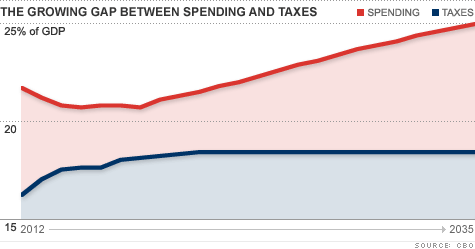
NEW YORK (CNNMoney) -- Lawmakers risk derailing the economic recovery if they act too soon to slash spending or raise taxes substantially. But if they wait too long to tackle the country's burgeoning debt, they risk damaging the economy for decades.
That's a key message from the Congressional Budget Office, which released its long-term federal budget outlook on Wednesday.
The CBO used the word "daunting" to describe the country's budget prospects over the next decade and beyond. It's a point the nonpartisan agency has made before but comes as Washington policymakers are struggling to strike a debt-reduction deal to satisfy lawmakers threatening to block an increase in the debt ceiling.
Assuming current policies remain in place, spending on the mandatory health programs and Social Security will grow by more than half over the next 25 years, bringing it to 16% of the size of the economy.
"By comparison, spending on all of the federal government's programs and activities, excluding interest payments on the debt, has averaged about 18.5% of GDP over the past 40 years," wrote CBO director Douglas Elmendorf in a blog post.
The resulting debt would continually set records. The CBO estimates that under current policies, debt held by the public will top 100% of GDP by 2021 and continue moving briskly north -- approaching 187% by 2035.
That's why the CBO again signaled to lawmakers that the sooner they address the coming budget shortfalls the easier the policy changes will be on everyone -- whether they occur on the spending side, the tax side or some combination of the two.
But Congress' fiscal watchdog also echoed a message that Federal Reserve Chairman Ben Bernanke has been delivering for months: As tempting as it might be to take a hatchet to the budget ASAP, implementing those changes too quickly could end up worsening, rather than improving the fiscal outlook.
"Making such changes while economic activity and employment remain well below their potential levels would probably slow the economic recovery," according to the report.
But that doesn't mean lawmakers should put off the debate to another day.
"The sooner that medium- and long-term changes to tax and spending policies are agreed on, and the sooner they are carried out once the economy recovers, the smaller will be the damage to the economy from growing federal debt," Elmendorf said.
Such damage would include soaring interest cost, perpetually slow economic growth, increased risk of fiscal crises and the likelihood of draconian spending cuts and tax hikes.
There is plenty of arsenal in the CBO report for both Republicans and Democrats to draw from in their pitched battle over how to resolve the near-term and longer-term budgetary shortfalls.
But Elmendorf noted what seems like an obvious point but which is often lost in the partisan to-and-fro over tax and spending policies.
"There is a substantial mismatch between what the government would have to spend to maintain existing programs in their current form and the revenues that taxpayers are accustomed to providing the government to pay for those programs." ![]()
| Overnight Avg Rate | Latest | Change | Last Week |
|---|---|---|---|
| 30 yr fixed | 3.80% | 3.88% | |
| 15 yr fixed | 3.20% | 3.23% | |
| 5/1 ARM | 3.84% | 3.88% | |
| 30 yr refi | 3.82% | 3.93% | |
| 15 yr refi | 3.20% | 3.23% |
Today's featured rates:
| Latest Report | Next Update |
|---|---|
| Home prices | Aug 28 |
| Consumer confidence | Aug 28 |
| GDP | Aug 29 |
| Manufacturing (ISM) | Sept 4 |
| Jobs | Sept 7 |
| Inflation (CPI) | Sept 14 |
| Retail sales | Sept 14 |